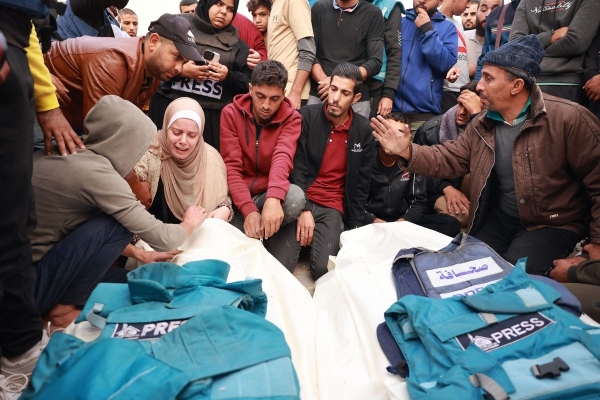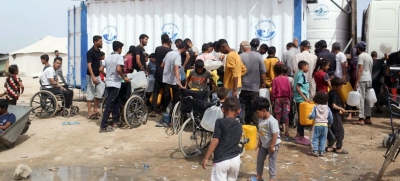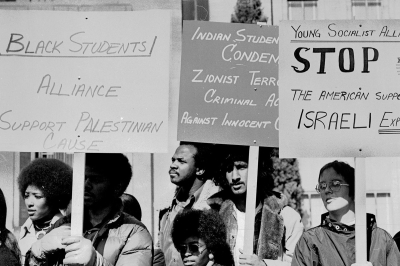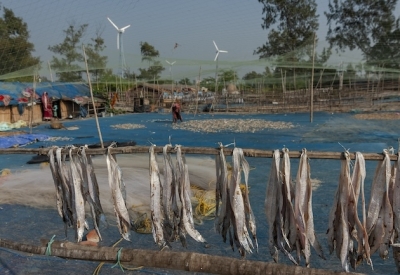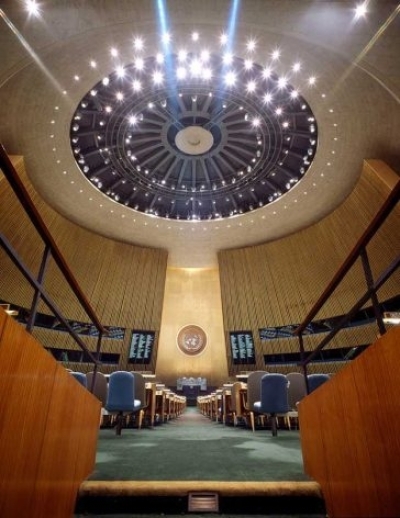The Gaza war has proved one of the deadliest conflicts for journalists in recent memory.
At least 63 journalists and media workers have been killed over the course of the war as of December 8, according to the Committee to Protect Journalists. That’s as many as were killed during the entire two-decade Vietnam War by some counts.
Most of those killed were Palestinians in Gaza, and dozens more Palestinian journalists have been reported injured, missing, or arrested. Additionally, family members of journalists — including those of Al Jazeera’s Gaza bureau chief and a CNN producer — have been killed in the bombardment, and the premises of more than 50 media outlets in Gaza have been hit. Journalists covering the war have also faced assaults, threats, and censorship, as well as contended with communications blackouts in Gaza.
Since the October 7 attack by Hamas, a Palestinian militant group designated as a terrorist organization by many countries, Israel has said that it cannot guarantee journalists’ safety in Gaza and has denied them access to the region, even during the recent temporary ceasefire. The exception is those working for organizations allowed to embed with the Israel Defense Forces under certain requirements, including prior review of anything they publish. Despite Israel’s claims that it tries to avoid civilian casualties, including that of journalists, its bombardment of Gaza has proved indiscriminate. More than 16,000 people have been killed in Gaza as of the last estimate by the Gaza Health Ministry, a figure that may be an undercount due to the large number of missing people and a breakdown in communications among hospitals in Gaza.
Hamas, for its part, has also long restricted political expression and the free press, using intimidation, physical violence, and torture to do so, according to human rights organizations. Even before the war, that also had a chilling effect on journalists operating out of Gaza.
All of this has made it incredibly difficult for journalists to deliver independent reporting that can provide a critical check on wartime propaganda, and has greatly decreased the number of reporters on the ground able to provide the world with a clear, factual understanding of what is actually going on in Gaza. In that vacuum, Hamas and Israel frequently offer dueling narratives of the reality on the ground that are often impossible to verify.
“We have to assume that journalists who are on the ground are objective observers. And so targeting them really means that you are trying to diminish public understanding and access to the news that these journalists are reporting,” said Kiran Nazish, a foreign correspondent who has reported from conflict zones and the founding director of The Coalition For Women In Journalism, a worldwide support organization for female journalists.
Israel’s history of killing journalists
Under international law, journalists don’t constitute a separate, protected class from civilians overall. However, just as it is illegal to intentionally target civilians or launch an attack that does not distinguish between military targets and civilians, it is also illegal to intentionally target journalists. Media cannot be considered military targets even when they are being employed for propaganda purposes unless they make an “effective contribution to military action” or they “incite war crimes, genocide or acts of violence,” according to the International Committee of the Red Cross.
Nevertheless, independent investigations have concluded that Israel has intentionally targeted journalists on multiple occasions.
The group Reporters Without Borders recently filed a complaint before the International Criminal Court accusing Israel of committing war crimes against journalists covering the conflict in the Palestinian territories — the third such complaint it has filed since 2018. Israel has opposed these complaints, arguing that the ICC has no jurisdiction over them because Palestine is not an independent state, despite the fact that it is recognized as such by 138 of the United Nations’ 193 members and is a party to the ICC, unlike Israel.
One journalist killed by Israeli fire in Lebanon during the most recent round of fighting, Reuters reporter Issam Abdallah, was explicitly targeted, Reporters Without Borders argues in its forensic analysis of the attack. Israel has claimed that it was responding to an anti-tank missile fired by the Iranian-backed militant group Hezbollah, which is designated by many countries as a terrorist organization, suspecting a “terrorist infiltration into Israeli territory” from Lebanon, only to later find out journalists had been harmed.
But Reporters Without Borders says that Abdallah and his colleagues were out in the open, not embedded with combatants, with their equipment, clothing, and vehicle clearly marked as “press,” and that an Israeli helicopter had flown over them twice in the hour prior to the attack, meaning that Israeli forces had time to identify them as journalists.
“There was, at the very least, a willful negligence on the part of the IDF in that case,” said Clayton Weimers, the executive director of Reporters Without Borders USA.
Rhetoric from Israeli leaders has sought to justify this kind of intentional targeting of journalists, particularly following a baseless November report from HonestReporting, a nonprofit organization that claims to combat anti-Israel bias in the media.
The organization suggested in a since heavily altered post that freelancers for the AP, CNN, New York Times, and Reuters knew about the October 7 attack and failed to give advance warning to prevent it. The news organizations vehemently denied those insinuations, and HonestReporting later admitted that it had no evidence to support its accusations.
But that didn’t stop Israeli leaders from invoking the report to paint journalists covering the conflict as combatants and therefore, fair game in its military operations. Prime Minister Benjamin Netanyahu’s office called the journalists named by HonestReporting “accomplices in crimes against humanity.” Danny Danon, a member of Netanyahu’s Likud party, wrote on X that Israel would “hunt them down together with the terrorists.”
Within days of HonestReporting’s publishing its post, eight family members of one of the journalists it named — photojournalist Yasser Qudih — were killed by four missiles that hit their house in southern Gaza, an area Israel encouraged people to evacuate to in order to avoid being bombed. Qudih survived the attack, telling Reuters, “Israel attacked my home.”
“It is absolutely worrying that these statements [by Israeli government officials] were made. I will say also that it is not surprising that these statements were made,” Nazish said, adding that it’s reflective of an agenda to sow distrust in the media.
Israel’s incendiary rhetoric about journalists and its attacks on journalists aren’t new developments, Weimers said. Before the latest Gaza war broke out, Israel had killed more than a dozen Palestinian and foreign media professionals since 2001, according to the Committee to Protect Journalists.
In one 2018 case, for instance, a United Nations commission found that an Israeli sniper “intentionally” shot and killed Palestinian journalists Yaser Murtaja and Ahmed Abu Hussein during demonstrations in Gaza for Palestinians’ right to return to their homes in Israel that they were forced from during the 1948 Nakba. Both were covering the protest for local Gaza outlets, and according to the report, both were wearing vests marked “press.” Israel responded by seeking to discredit Murtaja, with then-Israeli Defense Minister Avigdor Lieberman claiming that he was a member of Hamas’s military wing, despite the fact that no such ties were discovered when he was vetted by the US as part of an application for media credentials.
In another case in 2022, a UN investigation determined that Israeli forces killed Shireen Abu Akleh, a Palestinian American journalist who worked for Al Jazeera, while she was covering a raid on the Jenin refugee camp in the West Bank and was wearing a blue vest that read “press.” Immediately following her killing, Israeli officials argued that she had been “filming and working for a media outlet amidst armed Palestinians” and may have been killed by stray Palestinian fire, something that those on the scene rebutted. Israel later admitted that she was likely killed by Israeli fire, but ruled her death accidental and never charged the soldiers involved.
“Israel has long disregarded the safety of journalists, especially Palestinian journalists, and it has continuously misled or obfuscated the facts around particular killings of journalists,” Weimers said.
Israel is limiting press access to Gaza, where it was already difficult to be a journalist
In addition to killing journalists, Israel is preventing independent journalists from accessing Gaza on the premise that they cannot assure their safety. That’s made it incredibly difficult for anyone outside of Gaza to have a full, nuanced picture of what’s going on there in the best of times, and has made it extraordinarily difficult to get a full picture during wartime.
Some international news organizations — including CNN, ABC, NBC, the New York Times, and Fox News — have been permitted to enter Gaza if they accompany the IDF and agree to certain conditions. They have not been permitted to move unaccompanied in Gaza and have to submit all materials and footage to the Israeli military for review before publication.
“We and other news organizations accept these opportunities as they are often the only way to gain safe access to sensitive or dangerous areas at specific moments of editorial value,” a CNN spokesperson told Vox. “They are always just one part of our broader coverage on a story. We accepted this one as an opportunity to offer a limited perspective on the Israeli operation in Gaza as international journalists are not being allowed any other access at this time.”
Jeremy Diamond, a CNN reporter who has embedded with the IDF during the current conflict, said on CNN’s Tug of War podcast that the IDF only asked CNN to delete one piece of footage that “showed sensitive military technology on one of their armored personnel carriers” and to “blur images of maps, faces of soldiers, and anything that could potentially compromise” the location of a specific Israeli military base.
NBC’s Raf Sanchez said that he has received similar requests from the IDF as part of his embedding agreement. A spokesperson for NBC pointed out to Vox multiple stories and segments in which the network acknowledged that the IDF was allowed to review its raw footage, but not any final stories.
The condition of prior review is fairly common in embedding arrangements, which the US government greatly expanded the use of during the Vietnam War as a means to shape more favorable coverage. But journalists don’t tend to face any real censorship as part of such arrangements, which have become standard practice in war zones, Weimers said. He added that embedding can provide a valuable resource to journalists’ audience. But at the same time, embedding provides only a controlled view of the conflict, one taken from the point of view of one side’s forces, and it’s no substitute for independent reporting.
“It can’t be the only perspective because it’s obviously skewed in favor of one particular point of view,” Weimers said. “We need a more holistic picture of the conflict to understand what’s really going on. And that’s not possible unless reporters are able to safely come and go and report on what’s happening.”
The US and Israel, however, may not see it as in their interest to advocate for increased press access to Gaza. White House press secretary Karine Jean-Pierre recently told the AP, “We want to make sure that journalists are protected. What they’re doing on the ground is critical.” However, Politico reported that there was some concern in the Biden administration that permitting broader media access to Gaza during the temporary ceasefire that ended December 1 would allow journalists to “further illuminate the devastation … and turn public opinion on Israel” — and by extension, the US’s almost unconditional support for Israel. Independent journalists ultimately did not appear to gain access to Gaza during the ceasefire, though aid groups were able to further assess the damage and humanitarian needs, drawing attention to it in the media.
One additional factor making it difficult to deliver independent reporting from Gaza is repression by Hamas. A June 2022 survey by the Palestinian Center for Policy and Survey Research found that 62 percent of Gaza residents think they “cannot criticize Hamas’s authority without fear.”
That can make it difficult for journalists to cover dissent in Gaza, with their sources often seeking anonymity for fear of reprisal — a concern that is well-founded, based on high-profile cases in which journalists and activists have been arrested and threatened by the Hamas government. In 2019, for instance, Hamas security forces detained and interrogated a then-Amnesty International researcher and current journalist, Hind Khoudary, threatening to prosecute her for spying and working as a foreign agent if she continued her research. In 2022, Hamas reportedly broke into a Palestinian journalist’s home in Gaza and arrested him while he was reporting on a smuggling operation orchestrated by Hamas in which a number of Palestinians died on a boat that sank off the Tunisian coast.
In its October 7 attack, Hamas also killed four Israeli reporters, including Yaniv Zohar, a former Associated Press videojournalist who extensively covered the Israeli withdrawal from Gaza in 2005 and was the first person to cover Hamas’s kidnapping of Israeli soldier Gilad Shalit the following year. Reporters Without Borders has consequently asked the ICC to also investigate Hamas for committing war crimes.
“CPJ emphasizes that journalists are civilians doing important work during times of crisis and must not be targeted by warring parties,” Sherif Mansour, the organization’s Middle East and North Africa program coordinator, said in a recent statement.
Journalists covering the conflict are being harassed, arrested, and censored in Israel and the West Bank
Even journalists who aren’t covering the conflict from Gaza are doing their jobs under increasingly difficult conditions in Israel and the West Bank.
The Israeli government has arrested more than a dozen Palestinian journalists in the West Bank due to their coverage and their social media posts about the conflict, some of whom remain in detention or house arrest, according to CPJ. Under Israeli law, they can be held in what’s called “administrative detention” without charge for periods of three to six months that can be extended indefinitely.
Journalists have also been victims of escalating attacks by Israeli security forces and members of the Israeli public. In Tel Aviv, Israeli police forcibly removed two BBC Arabic reporters from their vehicle, searched them, and held them at gunpoint before hitting one of them on the neck. Al Jazeera English videographer Joseph Handal was hospitalized after being assaulted by Israeli settlers in the West Bank.
The Israeli government has also adopted an emergency law during the war to censor foreign journalists that they deem to threaten national security. Communications Minister Shlomo Karhi was prepared to invoke the law against Al Jazeera, saying in early November that the organization “photographed and published” the positioning of IDF forces, “broadcast military announcements by Hamas,” and “distorted facts in a way which incited masses of people to riot.”
However, only the Lebanese, pro-Iranian channel Al Mayadeen has so far been censored under the law, with Netanyahu’s security cabinet citing its “wartime efforts to harm [Israel’s] security interests and to serve the enemy’s goals” following the October 7 attack by Hamas, which receives funding from Iran.
Three of the network’s journalists, including two of its staff and a contributor, were subsequently killed in an Israeli bombing in southern Lebanon. Al Mayadeen TV and a Lebanese press freedom group accused the Israeli government of intentionally targeting two of their staffers and another local journalist contributing to their coverage, an act that would constitute a war crime. The Israeli government is reportedly investigating the bombing.
Even Israeli reporters have been impacted by Israel’s broader crackdown on wartime dissent. For instance, Israeli reporter Israel Frey’s home was surrounded by a far-right mob after he held a vigil for Israeli and Palestinian victims of the war, forcing him and his family to go into hiding. Karhi has also threatened the Israeli newspaper Haaretz with financial penalties and canceling state subscriptions to the paper, claiming that it has printed “lying, defeatist propaganda” that is “sabotaging Israel in wartime.”
For Israel, which is increasingly losing the international war of public opinion, all of this is a means of undermining independent reporting that could further damage its image abroad.
“It’s creating an environment that allows propaganda and fake news to thrive,” Weimers said.

